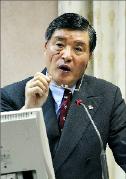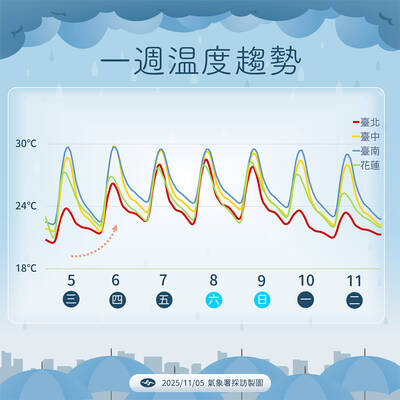The Ministry of National Defense yesterday said that following the arrest of a senior official on suspicion he was spying for China, the military has decided to give all military officials stationed overseas a polygraph test before, during and after their posting.
Minister of National Defense Kao Hua-chu’s (高華柱) remarks came after one-star General Lo Hsien-che (羅賢哲) was arrested in late January on charges of spying for China.
According to preliminary investigations, Lo was recruited by Chinese intelligence in 2005, when he was a defense attache in Thailand.

Photo: George Tsorng, Taipei Times
‘TEST OF LOYALTY’
Kao called the polygraph test proposal a “test of loyalty.”
Chinese Nationalist Party (KMT) Legislator Lin Yu-Fang (林郁方) said that after returning from Thailand, Lo became head of communications and electronic information at the Army Command Headquarters.
When asked if Lo had undergone a lie detector test before assuming the position, Kao said he had not.
Lin said he supported immediate amendments to the National Intelligence Services Act (國家情報工作法) making it compulsory for intelligence officials stationed abroad or taking a vacation to undergo a polygraph test.
Democratic Progressive Party Legislator Tsai Huang-liang (蔡煌瑯) said military officials could feel slighted if they were to take lie detector test, to which Kao said: “National security is more important.”
AIRPORT CLOSING
Meanwhile, Kao said the military planned to close a navy airport near Taiwan Taoyuan International Airport, adding the land should be added to the Taoyuan Aviation Special Zone.
Lin said that once the military acquired P-3C “Orion” marine patrol warfare aircraft from the US, it had proposed deploying six at Taoyuan, three in Pingtung County and three in Hualien County.
Lin said he feared closing the military base in Taoyuan would undermine those plans.
Kao said the aviation special zone was one of government’s most significant construction projects and that as the military had found an alternative scheme, closing the base would not have an impact on national security.

UNILATERAL MOVES: Officials have raised concerns that Beijing could try to exert economic control over Kinmen in a key development plan next year The Civil Aviation Administration (CAA) yesterday said that China has so far failed to provide any information about a new airport expected to open next year that is less than 10km from a Taiwanese airport, raising flight safety concerns. Xiamen Xiangan International Airport is only about 3km at its closest point from the islands in Kinmen County — the scene of on-off fighting during the Cold War — and construction work can be seen and heard clearly from the Taiwan side. In a written statement sent to Reuters, the CAA said that airports close to each other need detailed advanced

Tropical Storm Fung-Wong would likely strengthen into a typhoon later today as it continues moving westward across the Pacific before heading in Taiwan’s direction next week, the Central Weather Administration (CWA) said. As of 8am, Fung-Wong was about 2,190km east-southeast of Cape Oluanpi (鵝鑾鼻), Taiwan’s southernmost point, moving westward at 25kph and possibly accelerating to 31kph, CWA data showed. The tropical storm is currently over waters east of the Philippines and still far from Taiwan, CWA forecaster Tseng Chao-cheng (曾昭誠) said, adding that it could likely strengthen into a typhoon later in the day. It is forecast to reach the South China Sea

WEATHER Typhoon forming: CWA A tropical depression is expected to form into a typhoon as early as today, the Central Weather Administration (CWA) said yesterday, adding that the storm’s path remains uncertain. Before the weekend, it would move toward the Philippines, the agency said. Some time around Monday next week, it might reach a turning point, either veering north toward waters east of Taiwan or continuing westward across the Philippines, the CWA said. Meanwhile, the eye of Typhoon Kalmaegi was 1,310km south-southeast of Oluanpi (鵝鑾鼻), Taiwan’s southernmost point, as of 2am yesterday, it said. The storm is forecast to move through central

UNKNOWN TRAJECTORY: The storm could move in four possible directions, with the fourth option considered the most threatening to Taiwan, meteorologist Lin De-en said A soon-to-be-formed tropical storm east of the Philippines could begin affecting Taiwan on Wednesday next week, the Central Weather Administration (CWA) said yesterday. The storm, to be named Fung-wong (鳳凰), is forecast to approach Taiwan on Tuesday next week and could begin affecting the weather in Taiwan on Wednesday, CWA forecaster Huang En-hung (黃恩鴻) said, adding that its impact might be amplified by the combined effect with the northeast monsoon. As of 2pm yesterday, the system’s center was 2,800km southeast of Oluanbi (鵝鑾鼻). It was moving northwest at 18kph. Meteorologist Lin De-en (林得恩) on Facebook yesterday wrote that the would-be storm is surrounded by